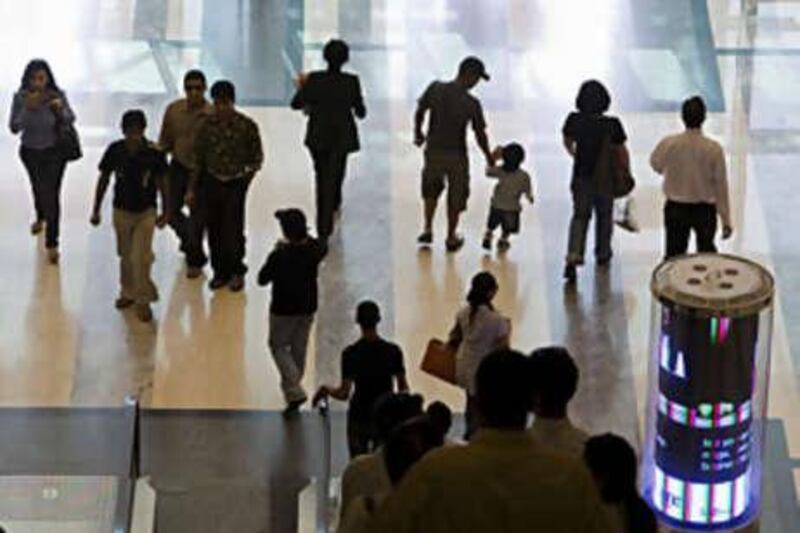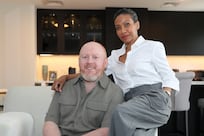ABU DHABI // Consumers in Abu Dhabi are bracing themselves for the aftershock of the global economic crisis that has battered big business in the region and is now showing signs of shaking consumer confidence. A straw poll conducted by The National shows that many are cutting back their spending on luxury goods, overseas flights, eating out and entertainment. There are also early indications that the credit squeeze that is causing difficulties for the big firms and developers in the UAE is also making it harder for individuals to secure the bank loans they need to start businesses, buy cars or invest in property.
The global liquidity crisis started to bite in the Gulf at the end of the summer, as international banks became increasingly unwilling to underwrite deals in the GCC. In the UAE, corporate borrowing by the end of the third quarter was down 16.5 per cent on the same period last year. Since the beginning of the year, the stock markets in Dubai and Abu Dhabi have fallen 60 and 31 per cent respectively.
Over the past few months the price of oil has collapsed by half from an all-time high of US$147 (Dh540) a barrel and this week Emirates Airline reported net profit for the six months to Sept 30 down 88 per cent from the same period last year. Also this week developers and Abu Dhabi bank managers warned that some ambitious property developments could be scaled back or shelved, while the Abu Dhabi Water and Electricity Authority said that since the global credit markets had seized up in September, it was struggling to finance new projects using traditional long-term financing.
It was inevitable that the avalanche of bad economic news of recent months would have a knock-on effect on the high street. Ricky Cruz, 29, from the Philippines, said he had tried to secure a loan to buy land in his home country, only to find that banks had slashed the amount of money they were prepared to lend. "Before, a bank offered me about Dh65,000 but I went back last month and it was half of that," he said. "They said it was their new policy."
With house prices in Britain and the United States tumbling in recent months, property investors are fearful that the malaise will spread to the housing market in the UAE. "I have investments in real estate but there is no liquidity in selling," said Varnishiya Zain, 26, an auditor. Ms Zain also said she doubted she would be able to secure a loan to buy a new car. Although the majority of those interviewed felt their jobs were secure, those working in sectors such as property and oil and gas were less confident.
Saravanan Murugesan, 34, from India, who works at an oil and gas project in Jebel Ali, said: "Working in my field, I'm very aware of the world's economic crisis. Just a few months ago a barrel of oil was $147 and it's gone down by almost half since then. These things make me worry about my job in the long term. "I don't want to end up one of the thousands all over the world who have been laid off. I have a family to take care of."
Maha Sharif, 22, and Mariam Mustafa, 34, from Sudan, both unemployed and searching for jobs in the capital, said local recruitment seemed to have dried up. "It's harder to find a job these days," said Ms Sharif. "My fiance was thinking of coming here from Sudan to find a job, but if I haven't been able to find a job for months now I don't think he will be any luckier than me." The economic uncertainty has encouraged many residents to tighten their purse strings, limiting expenditure on "unnecessary" luxury items such as new cars, electronic gadgets and holidays.
Sabah Khan, 39, a housewife from Tanzania, said she was fearful about the effects of the slowdown and had responded by reducing her family's spending. "Dining out is reduced to two nights a week as opposed to three nights," she said. Although inflation is expected to decline in line with lower consumption, few Abu Dhabi residents have noticed any easing in living costs. "I haven't noticed any change in food prices or rent," said Mrs Khan. "Everything is still high and school tuition and transport have also risen."
Looking at her two small shopping bags, she said: "I just spent Dh1,200 [$326] on nothing, just a few things. My husband will shout at me." A consultant for a private company in Abu Dhabi, Zeina Mehdi, 25, from Lebanon, said there was "no question that we all have to cut back on unnecessary expenses now. We have to think twice before booking a holiday, for example. "We should still be entitled to enjoy these types of luxuries, but there is some worry and we have to incorporate this into our new, tighter budget."
Ms Mustafa said it had become too expensive to fly to her home country, Sudan. "The economic situation that's affecting the whole world is affecting us indirectly," she said. "We're very careful in our spending habits now. It's too expensive to just fly home to Sudan now and harder to put money aside." Others, however, were confident that the UAE would emerge from the economic crisis relatively unscathed.
Claude Lamare, 60, from France, the director of a UAE project implemented by the French government, said: "I think my wife and I would have to worry more if we were still living in Europe. We are fortunate to be here in the UAE." Shahzad Salim, 28, and Taimur Nasr, 23, both Pakistani accountants, said there was "minimal uncertainty" and that their jobs would be secure. "The region will survive, especially Abu Dhabi. There is ample liquidity," said Mr Salim.
Both said they had made little change to their spending habits or lifestyles. Meanwhile, Tahani, a Sudanese medical lab technician who declined to give her second name, said she was confident the Government would ensure that the country was protected. "We're safe in the UAE because there is great support from the Government in the economy and they recently guaranteed money back in banks," she said.
Others, however, felt it was still too early to be confident of a happy outcome. Voltaire Mella, 38, a sales assistant from the Philippines who has lived in Abu Dhabi for four years, said: "It's scary to hear about what's happening and about people losing their jobs, but we're still not sure how it will affect us in the UAE." * The National






